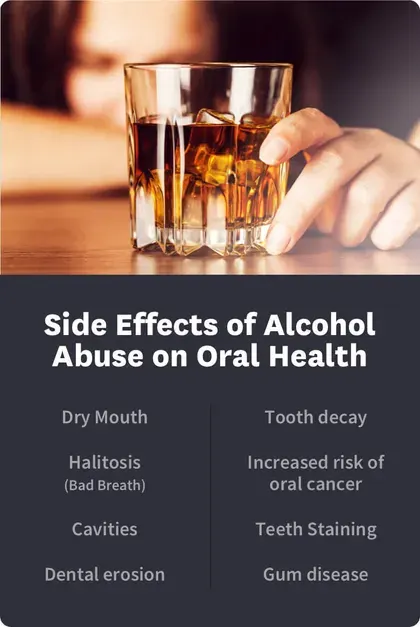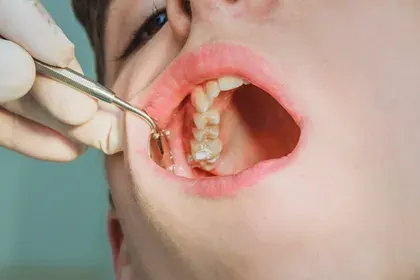Effects of Alcohol Abuse on Your Oral Health
Table of Contents
- Alcohol Abuse
- Your Mouth & Alcohol
- Dry Mouth
- Alcohol & Halitosis
- Oral Cancer
- Effects of Alcohol on Teeth
- Alcohol & Gum Disease
- Useful Resources
Alcohol abuse can negatively affect your entire body, including your mouth, teeth, and gums. Dry mouth, bad breath, oral cancer, tooth decay and erosion, and gum disease are some of the issues related to alcohol abuse. Alcohol inhibits your ability to make rational decisions and good choices, which can lead to poor oral hygiene habits, eating foods that are starchy and sugary, smoking, and potential trauma to the mouth and teeth. Alcoholic drinks are also often acidic or high in sugar and alcohol can lead to dehydration.
Regular alcohol consumption can impact the levels of bacteria in your mouth. It can also lead to a weakened immune system, which can increase your risk for infections, disease, and illness. Alcohol abuse can cause dry mouth, bad breath, tooth decay, and gum disease, and increase your risk for oral cancer. Limiting your alcohol consumption can benefit your entire body and mind. Thankfully, there are many resources available to help manage alcohol abuse.
Alcohol Abuse

Drinking more than the recommended amount (two drinks per day for a man and one for a woman) on a regular basis can constitute a pattern of alcohol abuse.
Alcohol is one of the most commonly used addictive substances in the world. Binge or heavy drinking on a regular basis can have highly detrimental physical, mental, and social side effects.
Your Mouth & Alcohol
A number of things happen in your mouth and body when you drink alcohol.
Alcohol is dehydrating, which can lead to less saliva in the mouth than is necessary. This can increase the risk for tooth decay and gum disease.
Drinking can also impact your decision-making process. When you drink, you are more likely to make poor food choices and drink beverages that are high in sugars and acidic, which can be hard on your teeth. Drinking regularly can also influence your oral hygiene habits.
Your mouth is full of bacteria — both good and bad bacteria. When you eat and drink, the bacteria in your mouth mixes with those from what you are consuming. Brushing and flossing your teeth helps to regulate the bacterial makeup in your mouth by eliminating the bad bacteria, removing the plaque from your teeth, and keeping it from hardening into tartar, which requires a dental professional to remove.
Heavy drinking can negatively change the bacterial composition in your mouth. This can open you up to more oral health issues.
Alcohol abuse can have a number of side effects on your oral health, such as the following:
Dry mouth
Halitosis (bad breath)
Increased risk for oral cancer
Tooth decay
Cavities
Teeth staining
Dental erosion
Gum disease
Dry Mouth From Alcohol
Drinking alcohol can dry out the mouth, as it acts as a dehydrator. This can lead to irritation in the gums and breakdown of the teeth.
Saliva is necessary to keep the mouth healthy and the bacteria levels balanced. A dry mouth can contribute to the following issues:
Bad breath
Increased tooth decay
Higher rate of gum disease
Trouble eating and swallowing
Problems speaking
Frequent thirst
Swollen and cracked lips
Difficulties tasting properly
Fungal infections
Sore throat
Pain in the tongue
Alcohol abuse can also change the composition of saliva in your mouth, compromising the natural oral immune system and bodily defenses. This can lead to significant tissue damage, especially when combined with smoking.
Alcohol & Halitosis
Alcoholic drinks often leave a residue in the mouth that can contribute to bad breath, or halitosis. Often termed “beer breath,” alcohol can leave a distinctive taste and smell behind in your mouth.
Alcohol abuse can also make you less likely to brush and floss your teeth regularly. This can allow the “bad” bacteria more time to flourish and cause additional issues in your mouth.
Bad breath can be a side effect of alcohol abuse. It can also be an indicator for other oral and medical issues, such as these:
Gingivitis and periodontitis (gum disease)
Dry mouth
Diabetes
Advanced kidney or liver disease
Respiratory infections and diseases
Gastrointestinal issues
Oral Cancer
Excessive alcohol use and abuse can be a risk factor for several forms of oral cancer, as it puts your mouth and throat in regular and repeated close contact with alcohol. These are the four main types of oral cancer:
Mouth cancer
Laryngeal cancer
Pharyngeal cancer
Esophageal cancer
Oral cancers and tumors can form at any place in your mouth or throat and become life-threatening. These cancers are often not caught right away, which means they may have progressed too far for effective treatments.
Alcohol abuse, especially when combined with smoking, can increase your risk for oral cancer up to 15 times.
Signs of oral cancer can include the following:
Bleeding in the mouth
Ulcers
Swelling and the formation of a mass
A white or red patch in the mouth
Numbness in the mouth or face
Pain or trouble chewing, talking, or swallowing
If you notice any of these signs, it is important to get checked out right away. Oral cancers are often painless and go unnoticed until they have metastasized and spread.
Effects of Alcohol on Teeth
Alcohol abuse can have many negative effects on the teeth directly.
Heavy alcohol consumption can lead to tooth decay in a variety of ways.
First, it causes the bad bacteria in the mouth to outnumber the good, which can lead to a breakdown in the tooth enamel. Many alcoholic drinks are sugary or acidic, which can also contribute to the wearing down of the protective enamel.
Drinking alcohol increases the likelihood of snacking. Snacks are often in the form of refined carbohydrates, which also leads to plaque buildup.
Alcohol abuse often impacts oral hygiene. This can mean that plaque will stay on the teeth longer, as it is not regularly brushed or flossed away as needed.
As bacteria and plaque build up in the mouth and on the teeth, the enamel will start to wear away. Tartar forms on the tooth. This is hardened plaque that cannot be removed without the help of a dental professional.
Once enamel is destroyed, it cannot be repaired. The more it wears away, the more of the dentin and pulp underneath are exposed.
A hole in the tooth created by tooth decay is a cavity. Alcohol abuse increases the risk for cavity formation due to the regular presence of harmful acids, poor oral hygiene, dry mouth, and an imbalance of bacteria in the mouth. Cavities will need to be filled by a dentist with a specialized material.
Alcohol that is dark colored, especially red wine, can cause your teeth to become discolored. Regular and repeated exposure to these dark beverages can cause your teeth to become stained or appear dull.
Red wine contains tannin, natural dyes, and acids that can cause pitting and staining of your teeth. Your teeth are inherently porous. They can be filled with pigments from dark liquids, such as red wine.
Heavy drinking can therefore cause your teeth to look purple, brown, blueish, or a dirty gray color.
Alcohol abuse is also a risk factor for dental erosion. Not only can the acids in sugary alcoholic drinks disrupt the pH level and balance of your mouth, which can cause your enamel to be weakened, but alcohol abuse can also cause frequent vomiting. Vomiting increases the acid content in your mouth, which can result in dental erosion.
Alcohol abuse can raise the odds for tooth loss. This can be the result of significant tooth decay and/or gum disease from dental erosion, poor oral hygiene, or excessive teeth grinding.
Alcohol abuse can increase the rate of grinding your teeth, both at night when asleep and from intense emotions while drinking. Teeth grinding and gnashing can cause trauma to the teeth. Without proper dental care, it can potentially lead to tooth death and loss.
Alcohol & Gum Disease
Alcohol abuse contributes to plaque buildup on the teeth. This is a risk factor for gum disease.

Gum disease (gingivitis) occurs when plaque and tartar irritate the gums and cause the tissue to become infected. Substance abuse is a risk factor for gingivitis. In the early stages of gum disease, the gums are often red and swollen, and they will bleed easily.
Advanced gum disease (periodontal disease) happens when gingivitis is not treated, and plaque and tartar form under the gum line. This can cause the gums to recede, or pull away from the teeth, and pockets of infection to form. Gum and bone tissue can become infected and destroyed. Teeth can become loose, sensitive, and painful.
Gum disease is very common. Close to half of all adults ages 30 and older have some form of it.
Alcohol abuse can make periodontal disease worse, aggravating existing gum disease. This could be partially related to poor oral hygiene habits associated with heavy alcohol use.
Resources for Managing Alcohol Abuse
Alcohol abuse can affect all aspects of your life and body, including your oral health. There are many resources available to support those struggling with alcohol abuse. Managing alcohol abuse can be vital for your oral and overall health and well-being.Alcohol abuse resources include the following:
NIAAA Alcohol Treatment Navigator: Produced by the National Institute on Alcohol Abuse and Alcoholism (NIAAA), this resource provides information on treatment options and methods as well as research on alcohol use, abuse, and its effects
FindTreatment.gov: Operated by the Substance Abuse and Mental Health Services Administration (SAMHSA), this national link allows you to search for state-licensed treatment providers near you for help with alcohol abuse. They also provide information and resources on mental health and substance abuse.
CDC’s Alcohol Program: Run by the Centers for Disease Control and Prevention (CDC), this program offers information on alcohol use and abuse, statistics, current research, resources for individuals and families, and treatment providers.
Alcoholics Anonymous (AA): This peer-based support group has chapters all over the world to provide help and guidance regarding alcohol use and abuse.
Your medical provider can often help as well, offering connections to local resources and information on support groups and treatment programs to aid in the management of alcohol abuse.
Good oral hygiene and routine dental visits can help to reduce oral health issues that may have resulted from problem drinking. As you get professional help to manage your alcohol abuse issues, take time to see a dentist who can offer guidance on your oral health.
